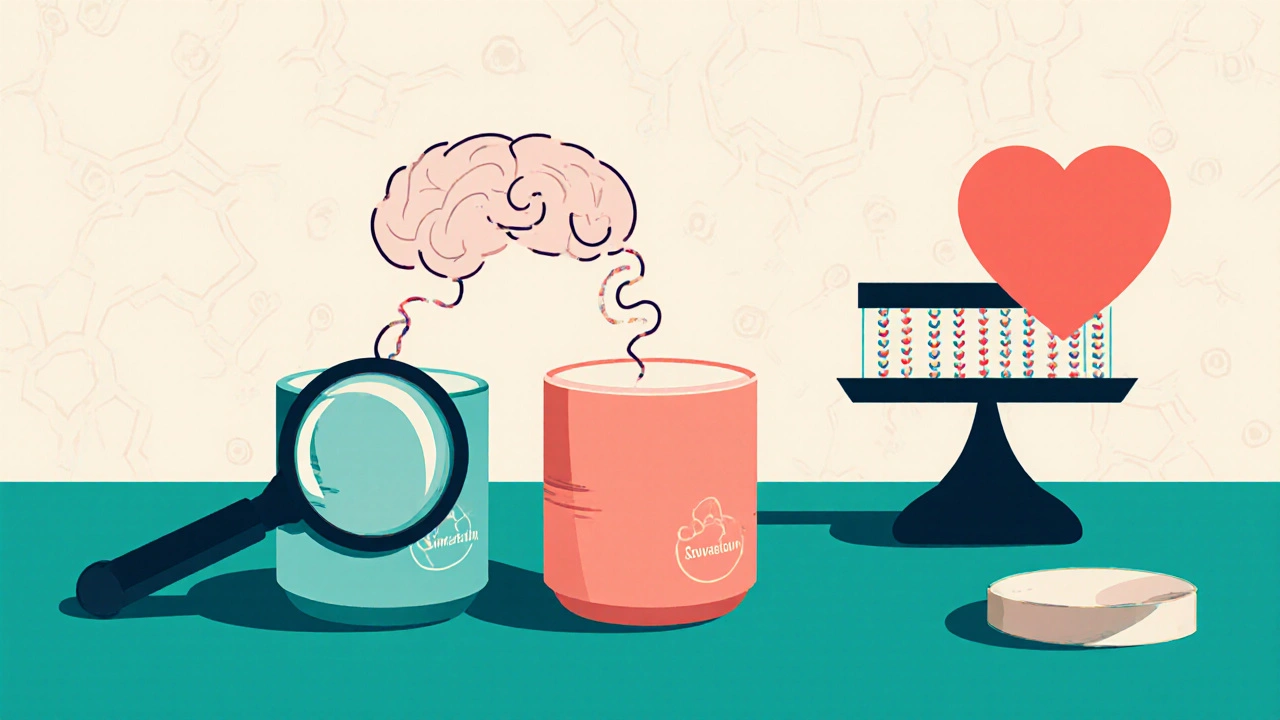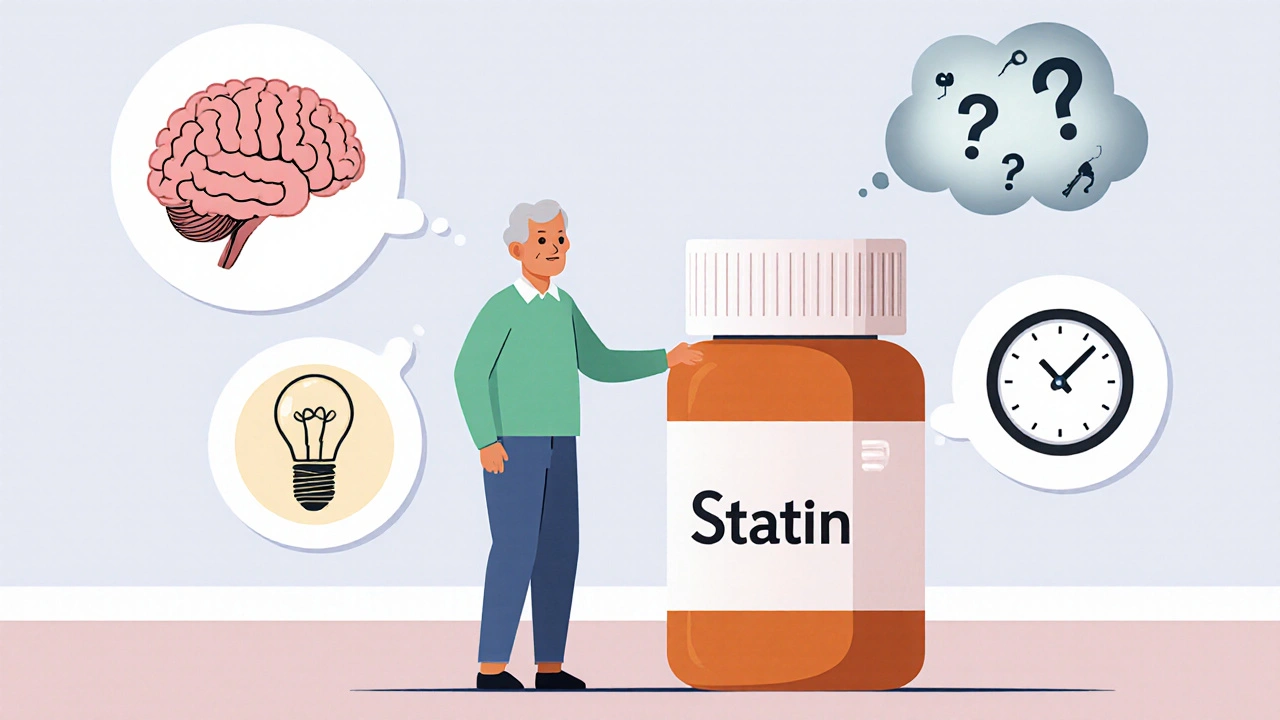Statin Memory Risk Calculator
Understanding Your Risk
Based on your statin type and age, this tool estimates your relative risk of experiencing temporary memory issues. Note: This is not medical advice but information to discuss with your doctor.
Your Memory Risk Assessment
Risk LevelSelect your statin and age to see your risk level
Results will appear here with detailed information
Key Facts About Statin-Related Memory Issues
- Reversibility: Symptoms typically improve within 2-4 weeks after stopping the statin
- Comparison: Lipophilic statins (simvastatin, atorvastatin) have 42% higher risk than hydrophilic ones (rosuvastatin, pravastatin)
- Long-term effect: Statins actually reduce dementia risk by 21% overall
Many people take statins without a second thought. They’re one of the most prescribed drugs in the world, and for good reason: they cut heart attacks and strokes by lowering bad cholesterol. But somewhere between the pill bottle and the doctor’s office, a quiet worry creeps in: statins and memory loss. Is it real? Or just a myth? If you’ve noticed trouble remembering names, feeling foggy, or losing focus after starting a statin, you’re not alone-and you’re not imagining it.
What Statins Actually Do
Statins aren’t just cholesterol pills. They block a key enzyme in your liver called HMG-CoA reductase, which your body uses to make cholesterol. By slowing this down, statins can drop LDL (bad) cholesterol by 30% to 60%, depending on the type and dose. That’s why they’re so effective at preventing heart disease. The most common ones you’ll hear about are atorvastatin (Lipitor), simvastatin (Zocor), rosuvastatin (Crestor), and pravastatin (Pravachol).
But here’s the twist: cholesterol isn’t just for your arteries. It’s also essential for brain function. Your brain uses cholesterol to build cell membranes and make connections between neurons. So when you lower cholesterol system-wide, it’s natural to wonder-could that affect your mind?
The FDA Warning That Changed Everything
In 2012, the U.S. Food and Drug Administration added a new warning to statin labels: “Rare cases of memory loss and confusion have been reported.” It wasn’t a big alarm bell. It was a quiet footnote. But for patients who’d already noticed mental fogginess, it was validation.
The FDA didn’t say statins cause memory loss. They said it could happen-and it usually goes away when you stop taking the drug. Around 60 cases were reported to their monitoring system between 1997 and 2002. Simvastatin and atorvastatin showed up most often. But here’s the catch: these were anecdotal reports. No one had proven cause and effect.
Does It Happen More With Certain Statins?
Yes. And it’s not random.
Statins fall into two camps: lipophilic and hydrophilic. Lipophilic statins (like simvastatin, atorvastatin, and lovastatin) are fat-soluble. That means they can cross the blood-brain barrier more easily. Hydrophilic statins (pravastatin and rosuvastatin) are water-soluble and mostly stay out of the brain.
A 2023 analysis of over 48,000 patients found lipophilic statins were linked to a 42% higher chance of people reporting memory issues compared to hydrophilic ones. But-and this is critical-when researchers tested actual memory and thinking skills using standard cognitive tests, there was no real difference. People felt foggy, but their brains didn’t show it on paper.
That gap between how people feel and what tests show is huge. It suggests something else might be going on.
Is It All in Your Head? The Nocebo Effect
Let’s talk about the nocebo effect. It’s the opposite of placebo. Instead of feeling better because you believe a pill will help, you feel worse because you believe it might hurt.
A 2020 study in the Journal of General Internal Medicine found that 28% of statin users said they had memory problems. But when they were tested, only 8% showed actual cognitive decline. That’s a big mismatch.
Why? Because once you hear statins might cause brain fog, you start noticing every missed word or lost key. You connect the dots-sometimes falsely. A 2015 study in JAMA Internal Medicine found that people taking statins had a higher risk of memory loss-but so did people taking other cholesterol-lowering drugs that don’t cross into the brain. That points to something else: awareness, not chemistry.

What the Science Really Says About Long-Term Risk
If you’re worried about dementia or Alzheimer’s, the data is surprisingly reassuring.
A 2022 analysis of 36 studies with over 1.2 million people showed that statin users had a 21% lower risk of developing dementia overall. For vascular dementia-caused by poor blood flow to the brain-the drop was even bigger: 33%. Why? Because statins protect your blood vessels. And your brain needs healthy blood flow just like your heart does.
The Rotterdam Study, which followed nearly 13,000 people for 15 years, found statin users had a 27% lower rate of dementia over time. That’s not a fluke. That’s a pattern.
So here’s the paradox: statins might cause short-term, reversible brain fog in some people-but over the long haul, they likely protect your brain from far worse damage.
Real Stories, Real Symptoms
Reddit’s r/Statins community has over 1,200 posts from people reporting memory issues. Most said symptoms started within 3 months of starting the drug. Many described forgetting appointments, losing words mid-sentence, or feeling like they were “in a haze.”
But here’s the hopeful part: 74% of those who stopped taking statins noticed improvement within 4 weeks. Some said their clarity came back like flipping a switch.
One woman in her 60s wrote: “I couldn’t remember my granddaughter’s name for two weeks. I thought I was losing my mind. I stopped Lipitor on a whim-and within 10 days, it was like I got my brain back.”
That’s not rare. Dr. Beatrice Golomb’s 2003 review of 60 case reports found that 56% of patients improved after stopping statins. And 4 out of 5 who restarted the same drug had the same problem again.
What Should You Do If You’re Worried?
If you’re on a statin and notice memory lapses, don’t panic. Don’t quit cold turkey. Talk to your doctor. Here’s what works:
- Track your symptoms. Write down when they started, how often they happen, and what triggers them. Did they begin right after your dose changed? After a stressful week? That context matters.
- Consider switching. If you’re on simvastatin or atorvastatin, ask about switching to pravastatin or rosuvastatin. These are less likely to enter the brain and may clear up your symptoms.
- Try a “statin holiday.” Your doctor might suggest stopping the drug for 4 to 6 weeks. If your memory improves, it’s likely related. If not, look elsewhere-sleep, stress, thyroid issues, or vitamin B12 deficiency can mimic these symptoms.
- Don’t assume it’s permanent. In nearly every documented case, cognitive symptoms reversed after stopping the drug. This isn’t progressive brain damage. It’s a temporary glitch.

When to Keep Taking Statins
If you’ve had a heart attack, stroke, or have diabetes and high cholesterol, the benefits of statins are overwhelming. Stopping them increases your risk of another cardiac event by up to 40% in the first year. That’s not a risk most people can afford.
Most doctors won’t stop statins for mild memory complaints unless they’re severe and clearly tied to the drug. The American Heart Association and the American College of Cardiology agree: the heart protection statins offer far outweighs the tiny risk of temporary brain fog.
Bottom Line: It’s Rare, Reversible, and Manageable
Statins and memory loss? Yes, it can happen. But it’s uncommon. It’s usually short-term. And it almost always goes away when you stop or switch drugs.
The bigger truth? Statins are saving lives-and brains-on a massive scale. The fear of memory loss shouldn’t keep you from taking a drug that could prevent a heart attack or stroke. But if you’re experiencing symptoms, don’t ignore them. Talk to your doctor. Track your experience. Try a switch. Give your brain a break.
You’re not choosing between a healthy heart and a sharp mind. You’re choosing the right tool for your body-and sometimes, that means adjusting the dose or the drug. That’s not failure. That’s smart medicine.
Can statins cause permanent memory loss?
No, there is no evidence that statins cause permanent memory loss. In every documented case, cognitive symptoms like forgetfulness or brain fog reversed after stopping the medication. The FDA and multiple medical societies confirm these effects are temporary and dose-dependent. If symptoms persist after stopping statins, another underlying cause should be investigated.
Which statin is least likely to affect memory?
Pravastatin and rosuvastatin are the least likely to affect memory because they are hydrophilic (water-soluble) and don’t cross the blood-brain barrier as easily as lipophilic statins like simvastatin or atorvastatin. Studies show patients switching to these two often report improved mental clarity without losing cholesterol control.
How long does it take for memory to return after stopping statins?
Most people notice improvement within 2 to 4 weeks after stopping statins. Some report feeling clearer within days. In clinical studies, 74% of patients who stopped due to memory issues saw improvement within a month. Full recovery typically happens within 6 to 8 weeks, but it varies by individual.
Do statins increase the risk of dementia?
No, the opposite is true. Large studies involving over a million people show statin users have a 21% lower risk of developing dementia overall, and up to a 33% lower risk of vascular dementia. Statins protect blood vessels in the brain, reducing the chance of small strokes and poor circulation that lead to cognitive decline.
Should I stop taking statins if I’m worried about memory?
Don’t stop without talking to your doctor. If you’re at high risk for heart disease, stopping statins can be dangerous. Instead, track your symptoms, consider switching to a hydrophilic statin like pravastatin or rosuvastatin, or try a 4-6 week break under medical supervision. Most cases of memory issues are reversible and don’t require stopping treatment permanently.
What’s Next?
The STATIN-COG trial, a major NIH-funded study tracking 3,200 statin users over five years, is expected to release its first findings in late 2024. It’s the largest study of its kind and could finally clarify whether cognitive effects are real, rare, or just noise.
Until then, the best advice is simple: stay informed, stay in touch with your doctor, and don’t let fear stop you from protecting your heart. Your brain might thank you for it-in more ways than one.


Wendy Edwards
i started simvastatin last year and totally thought i was dying my brain was just… gone. like i’d forget my own phone number. stopped it on a whim and boom-clarity like a morning coffee. no joke. my grandkids noticed i was back to telling stories right. statins are lifesavers but dont ignore your brain.
Jaspreet Kaur
life is balance right? heart beats but mind remembers. if your brain feels foggy its not weakness its your body whispering. try pravastatin. its like switching from a heavy coat to a light jacket. same warmth but less suffocation. chill out and listen.
Gina Banh
the nocebo effect is real but so is the biological mechanism. lipophilic statins DO cross the BBB. studies show it. the FDA warning isn’t fluff. if you’re on atorvastatin and feeling off-switch. don’t wait for dementia to prove it. your brain deserves better than placebo politics.
Deirdre Wilson
my mom took Lipitor and started calling my dad by her ex-husband’s name. i thought she was getting alzheimers. turns out? statin brain. she switched to rosuvastatin and now she’s back to knitting sweaters and remembering birthdays. it’s wild how fast it flips back. like a broken lightbulb that just needed unplugging.
Damon Stangherlin
if you're worried about memory, track it. write down the days you feel foggy. did you sleep well? stress high? or just took your pill? sometimes it's not the drug-it's life. but if it lines up with the statin? talk to your doc. don't guess. test it. your heart and head both matter.
Ryan C
the 2023 meta-analysis of 48k patients showed a 42% increase in self-reported memory complaints with lipophilic statins-but zero significant difference on neuropsychological testing. this is a classic case of perception ≠ performance. also, the FDA warning was based on 60 cases over 5 years. that’s less than 0.001% of users. stop overreacting 🤦♂️
Dan Rua
my dad’s on Crestor and he swears he’s sharper now. says his focus is better. i think it’s because he’s finally taking care of himself. but i get it-if you feel weird, talk to your doctor. no shame in switching. it’s not quitting, it’s optimizing. ❤️
Mqondisi Gumede
why do americans always think drugs are the enemy? in south africa we trust the science. statins prevent heart attacks. period. if you forget your keys its because you’re old not because of chemistry. this whole thing is a western overmedicated panic. stop blaming pills and start blaming laziness
Douglas Fisher
Wow. This is such an important, nuanced, and beautifully articulated piece. I just wanted to say thank you for not sensationalizing this issue. The distinction between anecdotal reports and clinical data is so often lost in public discourse. And the fact that cognitive symptoms are reversible? That’s hope. That’s science. That’s medicine done right.
Albert Guasch
Based on the current evidence-based guidelines from the American College of Cardiology and the American Heart Association, the risk-benefit ratio of statin therapy remains overwhelmingly favorable for patients with atherosclerotic cardiovascular disease or elevated LDL-C levels. The incidence of cognitive adverse effects is classified as rare, transient, and non-progressive. Discontinuation is not routinely recommended unless symptoms are severe and temporally associated with initiation or dose escalation.
Ginger Henderson
so… statins prevent dementia but cause brain fog? sounds like the pharmaceutical industry’s version of ‘you gotta break a few eggs to make an omelet.’ just sayin’.